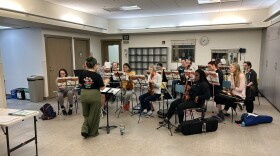Today, KPBS begins its series into a difficult subject. Abortion. In April, the Supreme Court upheld a ban on a second trimester abortion procedure called partial birth abortion. In its decision, the court also suggested some women may regret their abortion. Reporter Joanne Faryon introduces us to a long-time anti-abortion activist in part 1 of our series, Choice and Regret: A Look at the Current Abortion Debate.
Heather Mechanic: Women who have nightmares and eating disorders, substance abuse because of the pain that they're trying to block, please don't do this to yourself.
Heather Mechanic is a short, red headed woman in her early 60s, dressed in a grey pant suit, standing on a busy downtown sidewalk, shouting out to a fourth floor balcony.
Mechanic: Don't go into that house of horror. That is a house of shame.
Mechanic hopes her pleas will cause women to change their minds and walk out of this San Diego abortion clinic. It’s what keeps her coming here every Saturday morning, despite the honks from irritated drivers-by, and the many who give Heather Mechanic the finger. Most are offended by the oversized cardboard pictures of what she claims are aborted fetuses.
Even the Catholics who pray outside the abortion clinic want to distance themselves from her. On this day, they make a point of telling me they are not with Heather Mechanic.
But Mechanic is undaunted in her crusade. She says she is trying to save women from her fate. She had an abortion more than 30 years ago while living in New York as a single mother.
Mechanic: I was so depressed, so numb, so guilt ridden, that I attempted suicide and I took an overdose and I was in a ventilator for three days. It was a miracle I survived.
Mechanic became a born again Christian and anti-abortion crusader nearly 20 years ago. She is among an evangelical faction of the anti-abortion movement which claims women who have abortions eventually regret their choice. They want congress to ban abortion in all cases.
Their cause got a supportive shot in the arm in April when the Supreme Court upheld a ban on partial birth abortion . The second trimester procedure involves removing an intact fetus from the cervix. It accounts for less than 1 percent of all abortions.
But more than upholding the ban, the Court did something else. In his majority opinion, Justice Anthony Kennedy wrote: “While we find no reliable data to measure the phenomenon, it seems unexceptionable to conclude some women come to regret their choice to abort the infant life they once created and sustained.”
Just where did Justice Kennedy get this notion of “abortion regret?”
Caron Strong: Were you adequately informed to the nature and consequence of abortion. No, I wasn't informed.
In a North Hollywood neighborhood of quaint bungalows, at a picnic table in her friend’s backyard, Caron Strong reads from the hundreds of affidavits she has gathered from women who’ve had abortions.
Strong: How has your abortion affected you? I never drank or did any kind of drugs before that time. I considered suicide.
Strong is the national director of Operation Outcry , a project of a Texas based group called the Justice Foundation -- a conservative legal group that uses lawsuits to pursue its agenda. It submitted a brief to the Supreme Court in the partial birth abortion case, and included nearly 200 affidavits from women who say they regret their abortions. It was the brief Justice Kennedy cited in the courts’ decision. [ Click here to read a PDF of the brief from the Operation Outcry Web site . The affidavits begin on page 48.]
Strong: She started crying after the abortion and an attendant walked in and said what are you crying for, you knew what you were doing. And he grabbed her baby -- because it was born intact -- and he grabbed her baby by the feet and said, 'you knew this' and he dropped the baby in the bucket next to her bed.
Strong’s stories are at times fantastical, always anecdotal, and share a common theme. Blame abortion for divorce, drug addiction and alcoholism. Strong, herself, has had four abortions. She says if it had been illegal, she wouldn’t have had four.
Strong: That there are psychological consequences that women are not informed of and they need to be informed and there are real consequences the court needs to address and they did -- that women are truly impacted by this, and yes, and there are always someone who will say, “I wasn't impacted by this.” But there are those of us who say, “yes we were, and so our voices need to be heard.” And they made it a women's issue. And we're women. Hear our voices. And we've had it.
There have been studies into whether such a thing as post abortive syndrome exists. Including a 1989 review by C. Everette Coop -- admittedly anti-abortion and former Surgeon General during the Reagan years. He concluded there was no evidence of such a syndrome.
When Justice Kennedy cited Operation Outcry and the Justice Foundation in its brief, it came as a surprise to abortion rights groups. Operation Outcry had been considered a fringe group so extreme it wouldn’t be taken seriously by the court.
Strong: Not on the fringe anymore. Well, maybe its a good thing they didn't pay attention to us for a while. We've been focusing for a while on trying to help women and what do I say to them, well we’re not going anywhere. I'll say that.
Tomorrow we’ll hear from abortion rights activists and a woman who says she felt relief, not regret, after her abortion.





